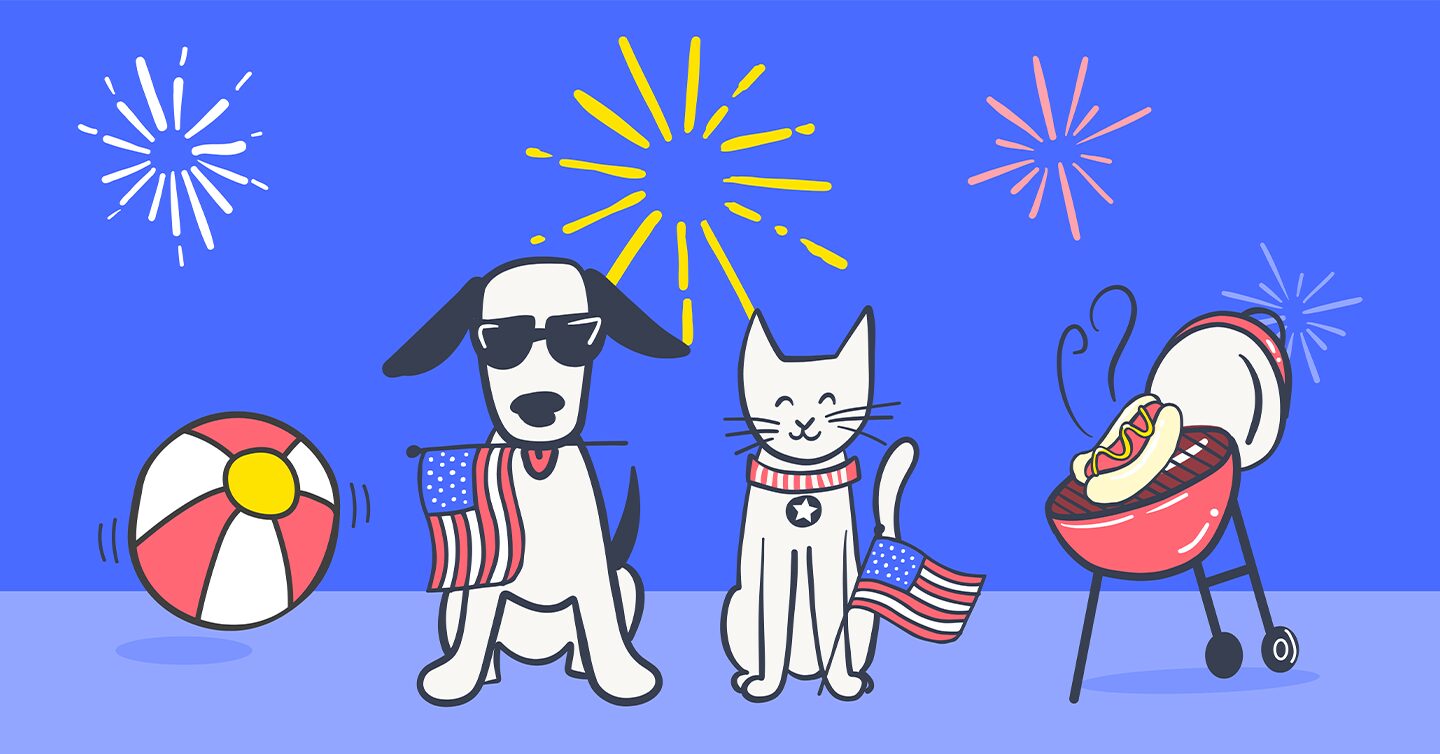Key Points
- Make sure your pet has a cool place to enjoy the festivities, with access to water.
- Keep a close eye on drinks, food, and trash which may be enticing to a curious dog or cat.
- Many pets go missing between July 4th-6th. Make sure your pet is microchipped and has ID tags with up to date information.
The 4th of July is typically the biggest celebration of the summer, with cookouts, pool parties, and massive fireworks displays. But while this holiday is fun for us humans – it can be quite a stressful day for our pets.
Loud noises – especially from fireworks – tend to make our furry friends feel anxious. Beyond that, pets can develop heat stroke, or even get poisoned if they consume toxic trash, food scraps, or debris left over from a barbecue. To help you avoid common ruh-rohs and cat-astrophes like these, here are five safety tips to help keep your dogs and cats happy and healthy as you celebrate this 4th of July.
1. Don’t let your pet get lost.
More pets go missing in the summer than any other season, especially around the 4th of July. PetAmberAlert, a database that helps lost pets reunite with their humans, reports that animal control officials across the country see a 30-60% increase in lost pets around the holiday. This is because of a few factors, the main one being that Independence Day celebrations often give pets more opportunities to leave the house.
“Be sure to keep your pets inside on the 4th of July – loud noises can be scary, and even pets that are used to going out may get scared, run, and then become lost,” says Dr. Jessica Greenberg, BVMS, MRCVS, at Bullshead Pet Hospital. “Also it’s a great time to check if your pet is microchipped just in case they do get away.”
Not coincidentally, July is also National Lost Pet Prevention Month. There’s no better way to prevent the loss of your pet than by getting them microchipped. If your pet is already microchipped, it’s a good idea to check that the registration and information connected to it are up to date.
Beyond microchipping, make sure your pet’s ID tags are attached to their collars properly. And if you leave the house, ensure that your pet is in an enclosed area they can’t escape from and double-check that all doors, windows, and fences are closed and locked. If you do plan on bringing your pet out for the holiday, make sure they’re with you at all times.
2. Know how your pet responds to noises.
Loud noises make pets feel stressed and anxious. If they get really spooked, they might panic and run away. Sparklers, fireworks, and other sources of loud noise can be very unsettling for your them, so make sure you’re sensitive to this fact and take the proper precautions to ease their fear and anxiety.
According to Zoetis, two-thirds of all dogs have noise aversions. (They’re pretty common in cats as well.) To keep your pet calm during the festivities, here are a few things you can do:
- Keep them contained to one area in the house, perhaps where they spend the most time and are usually the most comfortable. This might be in their crate, or a specific room they like being in.
- Play calm music for your pet. A quick Google search will lead you to several video and audio tracks specifically designed to create a tranquil atmosphere for your dog or cat.
- Leave an item of clothing or a blanket with your scent on it for your dog. This can help them feel safe and secure when you’re not around.
- Try a thunder shirt. Proven effective for many pets, it applies gentle, constant pressure to calm anxiety and fear due to environmental triggers, like loud noises.
- If necessary, talk to your veterinarian about anti-anxiety medications or medications specifically labeled for noise aversion.
You can also better prepare your pet for loud noises ahead of time. Dr. Stacy Choczynski Johnson, Pumpkin’s resident veterinarian, advises pet owners to find a video recording of anxiety-inducing noises like fireworks and to gradually introduce your pet to this sound. “Play it at a low volume, and create a happy, positive experience for your pet,” she says. “This could mean giving a favorite treat, stuffing a puzzle toy full of goodies, or just a relaxing belly scratch. At each subsequent session, you can increase the volume in small amounts. The goal is to get your pet accustomed to the noise.”
3. Keep harmful foods out of reach.
If you plan on bringing your pet along for the patriotic festivities, be aware of possible digestive threats. Your pet will happily find themselves in a sea of table scraps, most of which are not good for them. Fatty, barbecued meats and harmful ingredients like onions, garlic, and chocolate are likely to be part of any 4th of July feast or picnic – and they should be kept out of paw’s reach!
Xylitol is a type of sugar alcohol that is used to replace sugar in many common items like sugar-free candy, baked goods, and even peanut butter. It can be very harmful to pets. Pets may get into these items during the busy holiday. If they do, check the ingredients list for Xylitol and if you see it seek veterinary advice immediately.
The easiest way to avoid an emergency vet trip for a digestive issue is to keep your pet on a leash and with you at all times. And since you can’t expect everyone at an event to look out for your dog or cat, it’s your responsibility to keep human food away from them. There are some foods that can be safe for dogs and cats, but most human food is not.
If your pet does eat something harmful, monitor their behavior closely and consider contacting ASPCA’s Animal Poison Control Center at (888) 426-4435. Many foods only cause minor stomach upset and will go away with time or after vomiting, but if your pet seems to be suffering – the best thing you can do is contact your veterinarian or the helpline listed above immediately.
4. Keep dangerous party favors out of paw’s reach.
Aside from food, you should also keep your pet away from party favors. Chemicals and heavy metals found in fireworks and sparklers can have very harmful effects on pets if ingested, ranging from gastrointestinal irritation to seizures. The Animal Poison Control Center reports that they most commonly receive calls about pets who eat sparklers, which contain a variety of salts that – in low concentrations – can cause stomach distress. However, ingesting these chemicals in large quantities can lead to more serious health problems.
Again, the best way to prevent your pet from ingesting dangerous party favors is to keep them in sight at all times. This is especially important if your group is setting off sparklers or attending a fireworks display.
5. Understand how hot is too hot for your pet.
Temperatures exceeding 85°F (24-29°C) can be dangerous for dogs and cats. At these temperatures for extended periods of time, pets are in danger of heatstroke or heat exhaustion. On an 85°F day, temperatures inside a car, even with the windows slightly open, can reach 105°F in 10 minutes. This is not safe for any pet or even a human.
The Humane Society warns pet owners to be conscious of humidity levels as well, as this can sometimes have a greater impact on your pet than the heat itself. Many animals pant in order to remove moisture from their lungs and cool down, but if the air is too humid, they can’t do so effectively. High temperatures can also heat up the ground your pet walks on, burning their sensitive paw pads. Check the heat by placing your hand or bare foot on the ground before letting your pet step outside. If it’s too hot for you, it’s too hot for them!
To avoid heat-related health issues, it’s best to just keep your pet inside an air-conditioned or otherwise well-cooled area on hot days. If that’s not an option, make sure to have plenty of water available for your pet at all times. Consider buying shoes for your pet to protect their paws from the hot concrete or pavement. You can also carry a small travel fan with you to cool down your pet if they’re getting overheated, or an inflatable baby pool they can hop into.
Beyond taking these steps to ensure your pet’s safety, Pumpkin Pet Insurance is a great way to help you be prepared for crucial veterinary care if they get hurt or sick this holiday, or any day of the year for that matter! To get a free quote, simply answer this quick survey about your pet.
Wishing you and your fur family a cool, calm, safe, and pawtriotic 4th of July!




